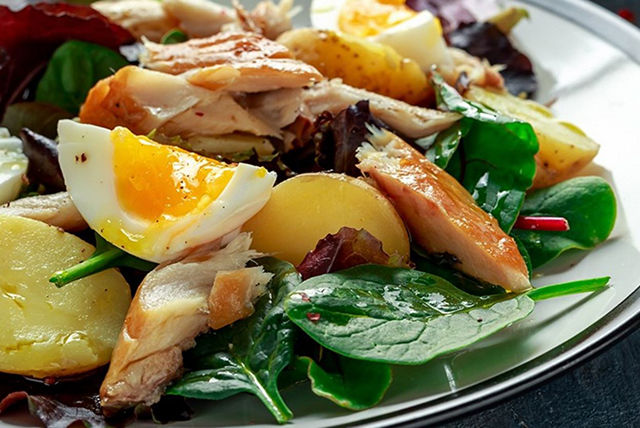At 7 weeks pregnant, you’re well into the second month of pregnancy, and over halfway through your first trimester.
7 weeks pregnant: pregnancy symptoms and your baby’s development

Explore pregnancy stages week by week
7 weeks pregnant is how many months?
Month 2 (Trimester 1)
It might be early days, but at 7 weeks pregnant, the fact that you’re going to be a parent to the little one growing inside you might be starting to sink in. You’ll likely be feeling a number of emotions right now and wondering what to expect as your pregnancy progresses.
Well, you’re in the right place, as we look at what’s happening for you and your baby at 7 weeks pregnant, including any 7 weeks pregnant symptoms, your baby’s brain development, and the importance of iodine and other prenatal vitamins during your pregnancy.
Your baby’s development at 7 weeks pregnant
It’s a busy time for your baby when you’re 7 weeks pregnant. Their brain is developing rapidly, along with your baby’s spinal cord and nervous system, producing approximately 100 brand-new brain cells every minute1.
Your baby’s heart has now started to beat, which you might be able to hear if you have a 7-week scan2. Cartilage is now beginning to form in the tiny limb buds that appeared at around weeks 5 and 6 of your pregnancy, which will become the bones in your baby’s arms and legs. In addition, the flattened ends will become their tiny hands1.
At 7 weeks pregnant, your baby’s lungs are taking shape and look a little like the structure of a tree. Their airways (also known as bronchi) are forming, and all of these will be in place by the time you reach week 16 of your pregnancy3.
 Your baby's development at 7 weeks
Your baby's development at 7 weeks
What does my baby look like at 7 weeks pregnant, and how big are they?
At 7 weeks pregnant, your baby is about the size of a grape or large blueberry, measuring approximately 10mm from head to bottom (you may hear your midwife refer to this as the crown to rump length)1.
If you could see your baby’s face, you’d be able to spot small dimples in the place where their ears and nose will be. There are also tiny eyelids growing that will soon cover your baby’s eyes1.
Because your baby’s brain is developing rapidly, their head is growing much faster than the rest of their body, and their forehead is relatively large and out of proportion1, As your baby grows, the other parts of their body will start to catch up, and they’ll develop a more baby-like appearance.
Pregnancy at 7 weeks (1st trimester): what’s happening in my body?
Your uterus is now around the size of a lemon1, and it will be a few weeks before you’ll have a visible baby bump, especially if this is your first baby.
During pregnancy, your blood volume can increase by as much as 50%, helping to provide your baby with all the oxygen and nutrients it needs as they grow. This can make you feel thirstier than you usually would, so drink plenty of water to stay hydrated1.
Wondering how much water to drink in pregnancy?
Early Pregnancy symptoms at 7 weeks
For some women, the changes that take place during pregnancy can bring any number of symptoms, while others don’t experience any at all. Let’s look at some common 7 weeks pregnant symptoms and how to manage them.
Breast tenderness is one of the tell-tale early pregnancy symptoms. It’s thought to be caused by an increase in progesterone and your body starting to develop milk ducts as your body gets ready to feed your baby after birth4.
Some breast changes you might notice at 7 weeks pregnant include5:
- Soreness, tenderness and a tingling sensation.
- Your breasts becoming larger.
- The veins in your breasts becoming more prominent and visible.
- Darker nipples.
You're not alone if you feel more tired than usual at 7 weeks pregnant. It’s very common to experience feelings of exhaustion at 7 weeks pregnant, as those pregnancy hormones make their way around your body6.
It’s very important to listen to your body, so rest when you need to, drink plenty of water, and eat a healthy and balanced diet.
Morning sickness is a very common pregnancy symptom, although the term can be misleading because many women experience it at all times of the day7. It’s most likely caused by hormonal changes during your pregnancy, and while it can be unpleasant to deal with, it’s unlikely to cause any harm to your growing baby8.
The good news is that in most cases, symptoms will ease anywhere between weeks 16 and 20 of your pregnancy7.
When to seek medical advice for morning sickness
If you’re struggling to manage the symptoms of your morning sickness or to keep any food or fluid down, it could be that you’re experiencing a severe form of morning sickness known as hyperemesis gravidarum, so it’s best to speak to your healthcare professional. You should also seek medical advice if your nausea or vomiting is accompanied by9:
- Dark-coloured urine or difficulty having a wee.
- Feelings of dizziness and weakness.
- Abdominal pain.
- A high temperature.
- Weight loss.
Whilst you may not have a visible baby bump just yet, at 7 weeks pregnant, you might be feeling bloated and full of gas. This is down to the amount of progesterone in your body, which helps the muscles of your uterus - and your digestive system - relax as your baby grows10. To help keep symptoms to a minimum, avoid eating spicy foods and eating late at night.
At 7 weeks pregnant, you may experience some implantation bleeding as the embryo embeds itself into the lining of your womb. In addition, pregnancy can result in changes to your cervix, which can result in some light bleeding. For example, after you’ve had sex11.
If you’re experiencing stomach cramps, this could be due to constipation, trapped wind, or the stretching of your ligaments as they stretch throughout your pregnancy12.
Always seek medical advice if you experience any stomach pain alongside12:
- Spotting and bleeding.
- Regular ‘tightenings’ or pains.
- A burning sensation or pain when you go for a wee.
- Unusual vaginal discharge.
Frequent trips to the toilet for a wee are a common symptom of pregnancy. As your pregnancy progresses and your uterus expands, additional pressure is put on your bladder, which may result in more frequent urination.
Those frequent trips to the loo might be annoying, but your body still needs to stay hydrated. So, make sure you continue to drink plenty of water.
Changes to your mood during pregnancy are common and can be caused by increased oestrogen and progesterone levels13.
It’s important to keep an eye on how you’re feeling during your pregnancy, and if you find yourself struggling, always seek medical advice to get the support you need.
Vaginal discharge is very common throughout pregnancy, not just at 7 weeks pregnant. The amount of vaginal discharge you experience may well increase as your pregnancy progresses as you get closer to your due date14.
It has an important purpose: preventing infections from travelling to your womb, and is caused by hormonal changes and increased blood flow to your vagina14.
If your vaginal discharge is milky white, clear and thin, then there’s nothing to be concerned about. If you notice that it smells unpleasant, is yellow or green, or you have itchiness and soreness around your vagina, always seek medical advice14.
At 7 weeks pregnant, you may notice darkened skin or brown patches on your face. The medical term for this is chloasma or melasma, but you may recognise it more commonly as the ‘mask of pregnancy’15.
In most cases, the condition is temporary and affects 50-70% of pregnant women. Exactly what causes chloasma is unknown, but it’s thought that how your body processes sunlight and pregnancy hormones may play a part16.
Focus on iodine
Iodine is an essential mineral that your body gets from food. It’s often found in plant-based foods like grains and cereals. However, how much iodine these foods contain depends on how much iodine the soil they grow in contains. Other good sources of iodine include17:
- Sea fish (read more about eating fish in pregnancy here).
- Dairy products, including cow’s milk.
- Shellfish.
- Eggs.

The science behind iodine
Iodine is vital for making thyroid hormones. These hormones support the health of your cells and how fast chemical reactions happen in your body (known as your ‘metabolic rate’)17. Iodine is also very important for your baby’s brain and future cognitive development18.
During pregnancy, it’s recommended that you take 200mcg of iodine daily, 50mcg more than the average adult. This is because you need more iodine during pregnancy to support the development of your baby’s brain19.
FAQs at 7 weeks pregnant
Will I have an ultrasound at 7 weeks pregnant?
You won’t routinely be offered a 7-week scan during your pregnancy, but you will be offered an ultrasound scan at:
- 12 weeks. This is known as your dating scan.
- 20 weeks. Known as the anomaly scan.
If you’ve experienced problems in this or a previous pregnancy, you may be offered an early pregnancy scan to ensure that your pregnancy is progressing well20. Some women also opt to pay privately for an early ultrasound.
How can I stay healthy at 7 weeks pregnant
You may have a while to wait until your baby is born, but it’s never too early to get into good habit when it comes to keeping healthy during your pregnancy. Here are a few things you can do.
Eat a healthy diet
Eating a healthy, balanced diet with a variety of foods is a great way to look after both yourself and your baby. Eat plenty of fruits and vegetables and be sure to incorporate carbohydrates for energy along foods that provide protein and calcium21.
Remember that you don’t need to eat for two, and it’s best to avoid eating foods that are high in sugar and saturated fats21. There are also certain foods that are best avoided in pregnancy, so it’s a good time to get in the know about what they are.
Exercise
If you feel up to it, doing some gentle exercise during your pregnancy has lots of benefits, including helping you to manage your changing weight and shape, and preparing for labour and birth. Why not try a gentle walk, run or swim, or give yoga a try?
Pregnancy vitamins
As well as the vitamins you’ll get from a healthy and balanced diet, it’s recommended that you take 400mcg of folic acid for the first 12 weeks of your pregnancy21. If you’ve got any questions about getting enough of the vitamins and minerals that you need, have a chat with your midwife who will be able to provide advice.
- NHS Best Start in Life. Week-by-week guide to pregnancy: Week 7 [online]. Available at https://www.nhs.uk/start-for-life/pregnancy/week-by-week-guide-to-pregnancy/1st-trimester/week-7/#look-like. [Accessed October 2025]
- NHS Inform. Ready Steady Baby! How your baby develops week to week [online 2024]. Available at https://www.nhsinform.scot/ready-steady-baby/pregnancy/your-baby-s-development/how-your-baby-develops-week-to-week/. [Accessed May 2025]
- Asthma and Lung UK. How children's lungs grow [online 2022]. Available at https://www.asthmaandlung.org.uk/how-your-lungs-work/how-childrens-lungs-grow. [Accessed May 2025]
- NHS Mersey and West Lancashire Teaching Hospitals. Possible breast changes during and after pregnancy [online]. Available at https://sthk.merseywestlancs.nhs.uk/media/.leaflets/65dde98b3d2da3.42242074.pdf#:~:text=In%20the%20last%20few%20weeks,to%20feel%20tender%20and%20sensitive. [Accessed May 2025]
- NHS. Signs and symptoms of pregnancy [online 2022]. Available at https://www.nhs.uk/pregnancy/trying-for-a-baby/signs-and-symptoms-of-pregnancy/#:~:text=Sore%20breasts%20in%20early%20pregnancy,may%20darken%20and%20stand%20out. [Accessed May 2025]
- NHS. Tiredness and sleep problems in pregnancy [online 2024]. Available at https://www.nhs.uk/pregnancy/related-conditions/common-symptoms/tiredness/#:~:text=Hormonal%20changes%20at%20this%20time,can%20make%20you%20feel%20low. [Accessed May 2025]
- HSE. Morning sickness causes and symptoms [online 2022]. Available at https://www2.hse.ie/conditions/morning-sickness/. [Accessed May 2025]
- NHS Best Start in Life. Morning sickness [online]. Available at https://www.nhs.uk/start-for-life/pregnancy/morning-sickness/. [Accessed October 2025]
- NHS. Vomiting and morning sickness [online 2024]. Available at https://www.nhs.uk/pregnancy/related-conditions/common-symptoms/vomiting-and-morning-sickness/. [Accessed May 2025]
- NHS Best Start in Life. Pregnancy week 10 [online]. Available at https://www.nhs.uk/start-for-life/pregnancy/week-by-week-guide-to-pregnancy/1st-trimester/week-10/. [Accessed October 2025]
- NHS. Vaginal bleeding in pregnancy [online 2024]. Available at https://www.nhs.uk/pregnancy/related-conditions/common-symptoms/vaginal-bleeding/#:~:text=In%20early%20pregnancy%2C%20you%20might,period%20would%20have%20been%20due. [Accessed May 2025]
- NHS. Stomach pain in pregnancy [online 2024]. Available at https://www.nhs.uk/pregnancy/related-conditions/common-symptoms/stomach-pain/#:~:text=Stomach%20(abdominal)%20pains%20or%20cramps,a%20poo%20or%20pass%20wind. [Accessed May 2025]
- NCT. Common emotions when expecting a baby [online 2025]. Available at https://www.nct.org.uk/information/pregnancy/wellbeing-and-lifestyle-pregnancy/common-emotions-when-expecting-baby. [Accessed May 2025]
- NHS. Vaginal discharge in pregnancy [online 2024]. Available at https://www.nhs.uk/pregnancy/related-conditions/common-symptoms/vaginal-discharge/#:~:text=When%20you're%20pregnant%2C%20it's,and%20should%20not%20smell%20unpleasant. [Accessed May 2025]
- NHS Best Start in Life. Pregnancy week 6 [online]. Available at https://www.nhs.uk/start-for-life/pregnancy/week-by-week-guide-to-pregnancy/1st-trimester/week-6/#whats-happening. [Accessed May 2025]
- Bolanca I, Bolanca Z, Kuna K, Vuković A, Tuckar N, Herman R, Grubisić G. Chloasma--the mask of pregnancy. Coll Antropol. 2008 Oct;32 Suppl 2:139-41. PMID: 19140277.
- NHS. Iodine [online 2020]. Available at https://www.nhs.uk/conditions/vitamins-and-minerals/iodine/. [Accessed May 2025]
- GOV.UK. Iodine: migrant health guide [online 2021]. Available at https://www.gov.uk/guidance/iodine-metabolism-migrant-health-guide. [Accessed May 2025]
- British Dietetic Association. Iodine [online 2022]. Available at https://www.bda.uk.com/resource/iodine.html. [Accessed May 2025]
- NHS Buckinghamshire Healthcare. Scanning in the Early Pregnancy Unit [online 2025]. Available at https://www.buckshealthcare.nhs.uk/pifs/scanning-in-the-early-pregnancy-unit/ [Accessed May 2025]
- NHS. Have a healthy diet in pregnancy [online 2023]. Available at https://www.nhs.uk/pregnancy/keeping-well/have-a-healthy-diet/. [Accessed September 2025]
Last reviewed: November 2025
Reviewed by Nutricia’s Medical and Scientific Affairs Team
related articles
Read More

Need some help?
You can get quick answers to common questions in our FAQs.
Alternatively, if you need help with general pregnancy or baby advice, or maybe on using or ordering our products - our expert team are always on hand to talk about feeding your baby.




